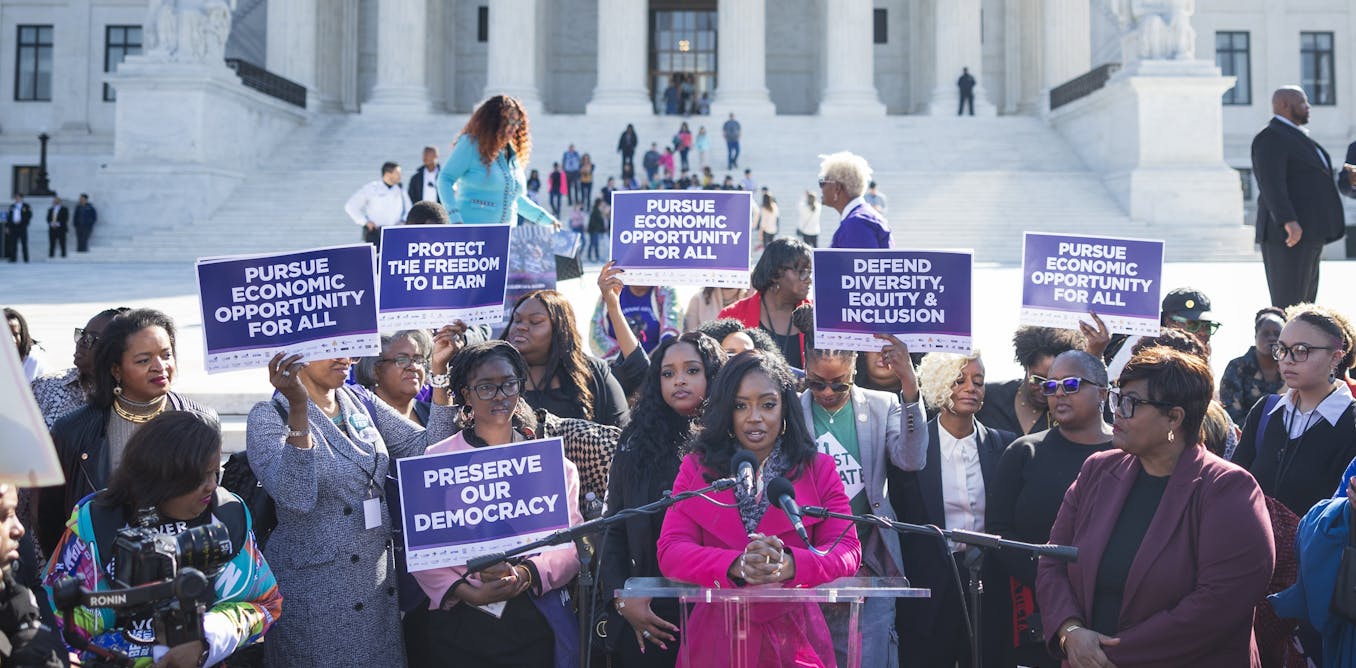In a 2-1 vote on June 3, 2024, a panel of the U.S. Court of Appeals for the 11th Circuit held that the Fearless Foundation – the charitable arm of the Fearless Fund venture capital firm – must suspend its Strivers Grant Contest. The contest is limited to Black women who are majority owners of businesses.
The Conversation asked Angela R. Logan, a scholar of nonprofit administration and diversity, equity and inclusion policies, to explain the significance of this case, American Alliance for Equal Rights v. Fearless Fund Management, and what’s at stake.
What is the Fearless Fund?
Ayana Parsons and Arian Simone, two experienced Black entrepreneurs, established the Fearless Fund in 2018 to provide financial and technical support to businesses led by other Black women.
The Fearless Fund also runs a charity, the Fearless Foundation. Among other things, it runs the Strivers Grant Contest, which provides four winners with US$20,000 and mentoring to help them grow their businesses.
The Fearless Foundation received $332,000 in revenue and had just $141,560 in net assets in 2022, the most recent year for which this information is available. In other words, it’s very small. Large U.S. foundations have multibillion-dollar endowments.
What is the American Alliance for Equal Rights?
The American Alliance for Equal Rights says it filed this lawsuit because it believes that denying non-Black people the opportunity to win a contract through the contest violates their civil rights.
The group, led by former stock broker and activist Edward Blum, is best known for its use of litigation to block affirmative action in higher education.
In June 2023, a majority of U.S. Supreme Court justices ruled on two cases the alliance brought on behalf of Asian American students who wanted to attend Harvard University and the University of North Carolina. The court found that race-conscious admissions in higher education were unconstitutional, effectively eliminating affirmative action for college and university admissions.
Unlike with their education cases, none of the plaintiffs whom Blum’s group is representing in this new case actually entered the Fearless Fund grant contest, because they believed they wouldn’t be awarded funding. They are also anonymous.
The American Alliance for Equal Rights responded to the ruling by saying it “is grateful” that the court has ruled in its favor, adding “our nation’s civil rights laws do not permit racial distinctions because some groups are overrepresented in various endeavors, while others are underrepresented.”
Eric Lee for The Washington Post via Getty Images
What does the ruling suggest about the status of DEI efforts?
This case is setting an important precedent by alleging that the Fearless Foundation’s contest violates a federal statute enacted as part of the Civil Rights Act of 1866: 42 U.S.C. Section 1981. That statute prohibits discrimination on the basis of race in contracts.
That law, passed right after the Civil War, was specifically supposed to protect recently emancipated Black people from discrimination.
In my view, shared by leading philanthropic organizations, the alliance is distorting U.S. racial history by using that statute to argue that it’s unconstitutional to help Black businesswomen overcome their lack of access to capital.
This litigation also is problematic because it is at odds with the traditional role that nonprofits play in the United States. By providing services that for-profit enterprises and the government do not offer, nonprofits bridge gaps. They have a long and storied history of assisting those on the margins of society: immigrant communities, people with different physical and mental abilities, and those living in poverty.
And because this case could set the stage for larger, more aggressive actions to dismantle corporate diversity, equity and inclusion efforts, I believe this ruling has struck another blow against attempts to make the nation’s economy and society more equitable, just and inclusive.
Why does this matter?
It is extremely hard for Black women with startups to build their businesses. Among all Black-led startups, financial support has declined steadily since it surged in the summer of 2020.
Businesses owned by Black and Latino women get less than 1% of all venture capital funding.
Not long ago, it seemed like this trend might turn around.
Following the outrage that followed the murder of George Floyd by Minneapolis police officer Derek Chauvin in May 2020, the private sector and nonprofits alike marshaled efforts to increase their giving and provide other kinds of support for Black people. Although the Fearless Fund was established before Floyd’s murder, it, too, saw increased interest and support – especially in 2021.
But as the general public’s attention and interest in justice for Black Americans has waned, so, too, have these commitments.
This diminished engagement has coincided with some states restricting or even banning DEI efforts altogether at public colleges and universities, including Florida and Texas. At least seven other states have passed similar laws restricting DEI programs and instruction tied to racial justice, and bills have been proposed in another 15 states.
This ruling could now make foundations leery of contributing to nonprofits that assist women and people of color out of a fear that they will be sued.
Where do you think this case is heading?
I think this case will eventually be heard by the Supreme Court.
If that happens, I hope the justices realize that opportunities for entrepreneurs of color remain limited. I believe they should recognize the need for efforts like the Fearless Fund and its Strivers Grant Contest that seek to level the playing field for Black women.
